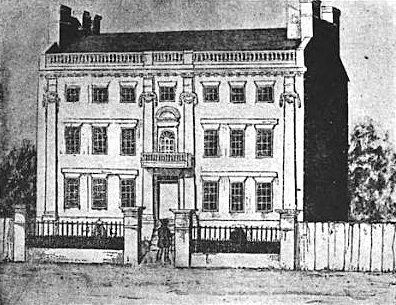Chasing Down an Unsuccessful Suitor
After I read the exchange of letters between Gov. Thomas Hutchinson and William Fitzwilliam on 6 Apr 1771, I decided to track down who this young suitor was.
For a long time I was stymied because the most prominent “Lord Fitzwilliam” of the time was the fourth Earl Fitzwilliam (1748-1833), an active member of the House of Lords who voted with the Rockingham Whigs. He was a nephew and, in 1782, heir of the Marquess of Rockingham. He was also some sort of cousin to Gov. John Wentworth of New Hampshire. He appears here in a portrait by Joshua Reynolds.
But in 1771 the fourth Earl Fitzwilliam was only in his twenties and therefore couldn’t have had a son seeking a bride in Boston.
Then in the Irish peerage I came across the sixth Viscount Fitzwilliam of Meryon or Merrion (1711-1776), and the puzzle pieces fell into place. That less prominent and lower-ranking Lord Fitzwilliam had four sons; according to Wikipedia (but not older print sources), all but one of those men eventually succeeded to the title without leaving more sons, so the peerage disappeared.
The only son of the sixth viscount who never got to be a viscount was the second, the Hon. William Fitzwilliam (1749-1810). He was the right age for the Boston wooer, though I can’t confirm that he was in Boston in 1771. Some Hutchinson biographers who have written about Fitzwilliam have assumed he was an officer in the Royal Navy, but I haven’t found evidence for that.
I did confirm a connection between the Hon. William Fitzwilliam and George Onslow, the British politician who thanked Gov. Hutchinson for how he’d handled this affair. Hutchinson wrote that Onslow was Fitzwilliam’s uncle. The relationship wasn’t that close. Onslow’s wife was Henrietta Shelley, a granddaughter of Sir John Shelley, third baronet of that line. Sir John’s only daughter, Frances, had married the fifth Viscount Fitzwilliam, the grandfather of the young wooer. That makes Onslow the husband of the Hon. William Fitzwilliam’s first cousin, once removed.
The Hon. William Fitzwilliam eventually did marry, in August 1782, to the only daughter of John Eames (c. 1716-1795), a master of chancery and tax commissioner. Aside from that marriage and his death, I haven’t been able to nail down any more facts about the man.
Fitzwilliam’s unsuccessful proposal of marriage was first published in James K. Hosmer’s 1896 biography of Hutchinson, then reprinted as a curiosity in several American newspapers. Probably not how he’d have wished to be remembered.
For a long time I was stymied because the most prominent “Lord Fitzwilliam” of the time was the fourth Earl Fitzwilliam (1748-1833), an active member of the House of Lords who voted with the Rockingham Whigs. He was a nephew and, in 1782, heir of the Marquess of Rockingham. He was also some sort of cousin to Gov. John Wentworth of New Hampshire. He appears here in a portrait by Joshua Reynolds.
But in 1771 the fourth Earl Fitzwilliam was only in his twenties and therefore couldn’t have had a son seeking a bride in Boston.
Then in the Irish peerage I came across the sixth Viscount Fitzwilliam of Meryon or Merrion (1711-1776), and the puzzle pieces fell into place. That less prominent and lower-ranking Lord Fitzwilliam had four sons; according to Wikipedia (but not older print sources), all but one of those men eventually succeeded to the title without leaving more sons, so the peerage disappeared.
The only son of the sixth viscount who never got to be a viscount was the second, the Hon. William Fitzwilliam (1749-1810). He was the right age for the Boston wooer, though I can’t confirm that he was in Boston in 1771. Some Hutchinson biographers who have written about Fitzwilliam have assumed he was an officer in the Royal Navy, but I haven’t found evidence for that.
I did confirm a connection between the Hon. William Fitzwilliam and George Onslow, the British politician who thanked Gov. Hutchinson for how he’d handled this affair. Hutchinson wrote that Onslow was Fitzwilliam’s uncle. The relationship wasn’t that close. Onslow’s wife was Henrietta Shelley, a granddaughter of Sir John Shelley, third baronet of that line. Sir John’s only daughter, Frances, had married the fifth Viscount Fitzwilliam, the grandfather of the young wooer. That makes Onslow the husband of the Hon. William Fitzwilliam’s first cousin, once removed.
The Hon. William Fitzwilliam eventually did marry, in August 1782, to the only daughter of John Eames (c. 1716-1795), a master of chancery and tax commissioner. Aside from that marriage and his death, I haven’t been able to nail down any more facts about the man.
Fitzwilliam’s unsuccessful proposal of marriage was first published in James K. Hosmer’s 1896 biography of Hutchinson, then reprinted as a curiosity in several American newspapers. Probably not how he’d have wished to be remembered.

